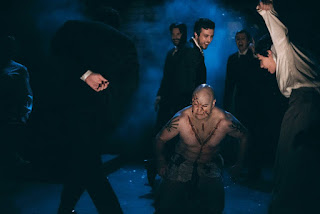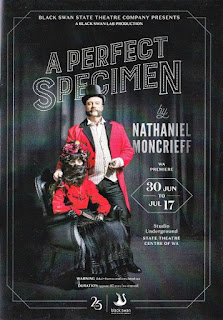The Gothics Trilogy comes to an epic conclusion with Second
Chance Theatre’s Frankenstein, faithfully adapted from the classic Mary Shelley
novel. The trio of plays has been a huge undertaking for the three theatre
companies operating under the banner of Murdoch University’s Nexus Theatre. Yet
Frankenstein ratchets up the scale and ambition to audacious heights. A cast of
over 20, use of a full size puppet horse, sumptuous costuming, and the
evocative lighting of the multi-level set are hallmarks of this two hour
fifteen minute production.
At the centre of it all is Scott McArdle who not only
adapted the novel, directed the production and plotted the lighting design but
was pressed into service in the lead role. This was after the original actor
pulled out in unfortunate circumstances only a month before opening night. To
say this was a Herculean effort on McArdle’s part would be a massive
understatement. Bruised, battered, and exhausted after the show, he was looking
forward to well-deserved sleep before doing it all again for closing night. You
can’t help but admire the tenacity, multi-disciplined talent, and sheer moxie
to even attempt a show like this.
I’ll start with some thoughts on his adaptation with the
confession that I have not read the novel…
The story is told in flashback, the framing device being an
encounter between Victor Frankenstein (McArdle) and Captain Walton (Rhianna
Hall) on a ship stuck in polar ice. The change of gender for Walton works well
as Hall plays the hard-nosed sceptic with sharp tongued flair.
The tale that is revealed by Victor is an expert
psychological profile of a man driven to achieve greatness but is derailed by
hubris and unchecked ambition. The Creature of his making is a torment that
brings death and destruction to those closest to him. We understand the genesis
of Victor’s obsession – the death of his mother trampled by a horse is the
significant catalyst that prompts him to delve ever further into arcane
studies. Indeed, the turning points are all beautifully crafted – the failed
first attempt to resurrect a life; the ultimate success that turns into ash
when both he and the Creature realise what he has done; the Creature’s journey
to eventual murder; and Victor’s thirst for vengeance.
That’s another key element. This is no mindless monster on
the rampage. Frankenstein’s Creature (Laughton Mckenzie) is literate and
capable of learning and emotion but bedevilled by the reaction to his hideous
appearance. He also wants a companion like himself; a request Victor ultimately
spurns which leads to his world crashing around him as the Creature kills his
friend Henry (Launcelot Ronzan) and most maliciously, his new bride Elizabeth
(Shannon Rogers). This is after accidentally killing Victor’s younger brother
William (Toni Vernon) then later a blind man and his daughter (Alex McVey and
Abbey McCaughan). All the while the bloodied ghost of Victor’s mother (Izzy
McDonald) spurs Victor on to more heinous deeds. The creator and his monster
are a well-matched pair of dysfunctional and traumatised souls.
Mckenzie is a menacing physical presence both in stature and
the makeup that indicates the stitches holding together the Creature’s
reanimated form. He picks the slight McArdle up like a rag doll which, in its
way, is more shocking than all the blood and gore on display. He had a tendency
though to shout too often which was an issue for several of the performers in
the more heightened of scenes. His primeval screams however, especially after
his ‘birth’, were harrowing.
Other performers of note – Shannon Rogers is a luminous
Elizabeth, beautifully costumed, and portraying an elegant and confident young
woman with style; Ellin Sears is always a dependable presence in every
production I see her in at Murdoch and her family maid Josephine is given quite
a complex and tragic arc; Hall as mentioned imbues the Captain with swagger
aplenty; and Ronzan is likeable as the faithful friend with a surprising twist.
German born Jenia Gladziejewski is the strict Professor who
sets Victor on his path to greater learning and it was interesting to hear the
actress after the show indicate she had to exaggerate her natural accent to
make it more ‘Germanic’. Rhys Hyatt and Stephen Platt have scene stealing secondary
roles as the fussy butler De Lacey and grotty Landlord respectively.
There were some elements that didn’t quite work. The score
by Drew Krapljanov did add tension in its more discordant moments but too often
scenes were undercut by the contrasting atmospheric mood music sitting under
the action. It felt like the emotion was being reinforced at the expense of the
inherent potential for conflict. That leached away tension and for an already
long play tended to give the impression of a statelier pace. While the lighting
design has been a highlight of all three plays there were times when actors
were cast in shadow, on the periphery stage left, in key scenes especially in
the latter stages. The first half ends somewhat abruptly and the change of POV
to the Creature at the beginning of the second half slowed the momentum built
up to that point.
The overall impression one is left with, however, is one
Victor Frankenstein himself might appreciate – the drive and ambition to create
a theatrical behemoth that must surely be the biggest undertaking to date at
the Nexus Theatre and one that will go down as a landmark moment and suitable
punctuation point to conclude the Gothic Trilogy.
The final show is on at 7.30pm 23 July at the Nexus Theatre
on the Murdoch University campus. Given the full house last night I would book
now!





















